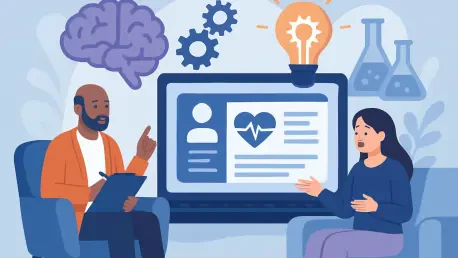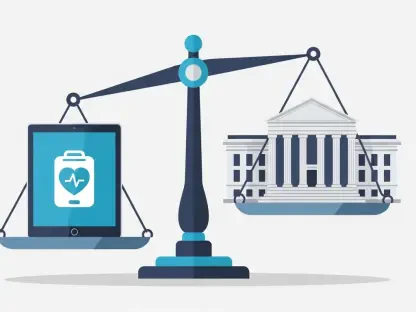In an era where mental health care is increasingly vital, the administrative burdens on providers often hinder their ability to focus on patients, creating a significant gap between need and delivery that impacts the quality of care. A staggering number of clinicians spend hours on paperwork, scheduling, and billing, detracting from the time they could dedicate to therapy sessions. Enter Headway, a New York City-based mental health company that has recently unveiled an enhanced electronic health record (EHR) platform designed to transform the landscape for providers. Announced earlier this week, this innovative system promises to streamline operations by integrating cutting-edge tools such as AI-assisted documentation and telehealth capabilities. By addressing long-standing operational challenges, especially for those accepting insurance, Headway aims to improve access to care and reduce clinician burnout. This development marks a significant step forward in an industry where technology has often lagged behind the needs of mental health professionals, sparking curiosity about how such a platform could reshape practice management.
Addressing Administrative Overload with Innovative Tools
The mental health sector has long grappled with cumbersome administrative tasks that drain providers’ time and energy, often at the expense of patient interaction. Headway’s newly expanded EHR platform tackles this issue head-on by offering a free, user-friendly system that contrasts sharply with traditional EHRs, which frequently come with steep monthly fees. With a network already encompassing over 60,000 providers, the company facilitates essential functions like credentialing, onboarding, and clinical training. The enhanced platform builds on this foundation by integrating advanced features such as AI tools that convert session summaries into insurance-compliant progress notes. These notes can be reviewed and edited for accuracy, ensuring compliance without the usual hassle. This focus on reducing paperwork through automation allows clinicians to redirect their attention to delivering quality care, addressing a critical pain point in the field and potentially transforming how mental health practices operate on a day-to-day basis.
Beyond documentation, Headway’s platform consolidates multiple operational needs into a single interface, a move that stands out in an industry where providers often juggle disconnected tools. Scheduling appointments, conducting telehealth sessions, documenting patient interactions, and managing billing are now seamlessly integrated. This all-in-one approach simplifies the complexities of running an insurance-based practice, making it more intuitive and less time-consuming. A spokesperson from the company highlighted that such consolidation directly benefits patients by enabling quicker and more affordable access to care. The flexibility of the system also shines through, as providers can choose to use minimal features like billing or opt for the full suite of tools based on their specific needs. Early metrics underscore the platform’s appeal, with over 200,000 AI-powered notes generated and a 40% increase in overall notes usage within the initial weeks of the rollout, signaling strong adoption among mental health professionals seeking efficiency.
Bridging Historical Gaps in EHR Adoption
Historically, mental health providers have faced a stark disparity in EHR adoption compared to their counterparts in physical health, a gap rooted in differing incentives and support structures over the past decades. While physical health clinicians received encouragement and resources to implement digital records, mental health professionals were largely left without similar backing, yet still held to the same insurer expectations for compliance. Headway’s solution seeks to level this playing field by delivering accessible, tailored tools that meet these standards without imposing financial burdens. Dr. Neha Chaudhary, the Chief Medical Officer, emphasized that easing administrative workloads is not just a convenience but a necessity for clinicians to prioritize patient care. This perspective reflects a broader consensus that operational efficiency is intrinsically linked to the quality of mental health services, positioning Headway’s platform as a much-needed intervention in a historically underserved area.
The significance of this initiative extends beyond immediate provider relief to address systemic challenges within the mental health care ecosystem. By offering a comprehensive EHR system at no cost, Headway not only alleviates the burden of managing multiple tools but also fosters greater accessibility and compliance with insurer requirements. This is particularly crucial for solo practitioners or small practices that may lack the resources for expensive software. The platform’s design acknowledges the diverse needs of providers through customizable options, ensuring that it can adapt to varying levels of technological comfort and practice size. Positioned alongside other digital health innovators in the space, Headway contributes to a growing industry trend toward technology-driven solutions. The strong initial uptake by clinicians further validates the demand for such integrated systems, suggesting that this platform could set a new standard for how mental health practices manage their operations in the years ahead.
Paving the Way for Future Impact
Reflecting on the strides made, Headway’s efforts demonstrate a pivotal shift in how mental health EHR systems could support providers under intense administrative pressure. The rollout of AI-assisted tools and telehealth integration marks a turning point, easing the burden that has long plagued clinicians. Looking forward, the focus should be on scaling these innovations to reach even more providers, particularly in underserved regions where access to mental health care remains limited. Stakeholders might consider partnerships or policy advocacy to further incentivize EHR adoption among mental health professionals, building on the momentum Headway has established. Additionally, continuous feedback from users could refine the platform, ensuring it evolves with the changing needs of the field. As technology continues to advance, exploring further integrations—such as predictive analytics for patient outcomes—could enhance the system’s value. Ultimately, the path ahead lies in sustaining this commitment to reducing barriers, ensuring that clinicians have the tools needed to prioritize patient well-being over paperwork.









